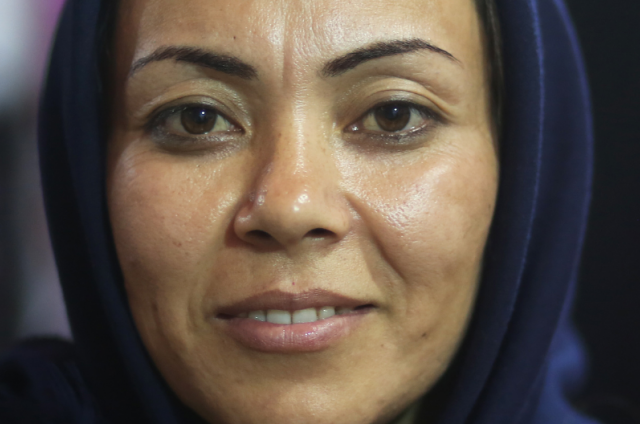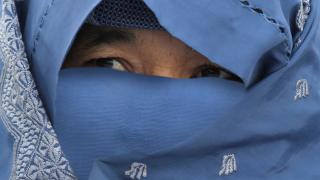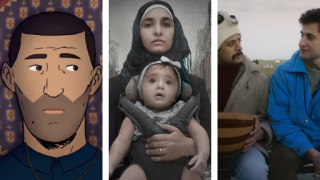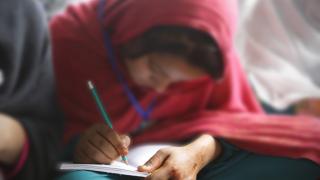Hear from Afghan women
Since August 2021, new restrictions have been introduced in Afghanistan that curb women's freedoms.
However, this has not stopped many courageous Afghan women from sharing their stories and continuing to advocate for girls and womens' rights.
It is as vital as ever that we let these women’s voices be heard and ensure that those still living in Afghanistan are not forgotten.
Explore this selection of literature, music, podcasts and more, to hear directly from Afghan women.
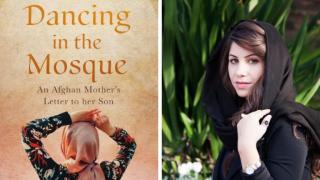
To read: Dancing in the Mosque
By author and activist, Dr. Homeira Qaderi
Hailed by The Observer as a ‘page-turning account of the lives of Afghan women’ this memoir documents Dr. Homeira Qaderi's strength, resilience and the sacrifices she was forced to make in the face of a repressive de facto government.
Though this book tells the story of Qaderi’s personal experience, it speaks to the character of millions of Afghan women who refuse to give up hope under extraordinarily dangerous conditions.
To watch: The dream of educating Afghan girls lives on
From co-founder and president of School of Leadership, Afghanistan (SOLA)
In her TED talk, Shabana Basij-Rasikh recounts her experience evacuating over 250 students, staff and family members from the ground-breaking institution she founded – Afghanistan’s first and only all-girls boarding school – after the Taliban took power.
As Shabana continues to advocate for girls' education, she urges her audience not to forget about Afghan women: "As Afghanistan slips from the front pages, do not look away."
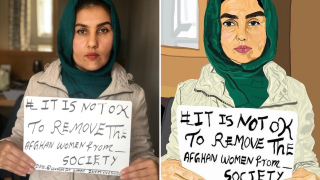
To read: Please Don't Forget Afghanistan
By Women for Women International advocacy coordinator, Latifa Farquizada
Before fleeing Kabul in August 2021, Latifa worked as an advocacy coordinator for Women for Women International. She now lives in London as a refugee but remains dedicated to helping women survivors of war. In this blog, she shares the emotional experience of leaving her country, how she dealt with an uncertain future and what the international community should be doing to protect the women who remain in Afghanistan.
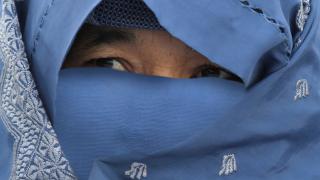
To read: No one hears our voices
Recommendations for action based on Afghan women's perspectives and experiences.
In this report, we spoke to current and former participants of our programme in Afghanistan, as well as the Afghan activists and organisations who have continued their work since the Taliban took control of the government in August 2021. They told us, in their own words, about the challenges they’ve faced, their hopes for the future and the support they would like to see from the international community.
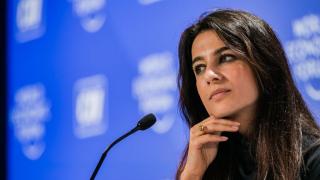
To follow: Yalda Hakim
@BBCYaldaHakim
Journalist and news presenter, Yalda Hakim, is determined not to let the world forget about the restrictions placed on Afghan girls' right to an education.
She has been using her social media platform to keep count of the number of days teenage girls have been banned from attending school using the hashtag #LetAfghanGirlsLearn.
To Listen: Sarzamine Man
By Women for Women International supporter, Meghan Kabir
Meghan is a multi-platinum Afghan-American singer and songwriter, who has written music for household names including Kelly Clarkson and Selena Gomez.
But she is also an advocate for peace, using her music to raise awareness for Afghanistan. Listen to her powerful self-composed song Sarzamine Man, which she hopes will bring people together to stand in solidarity with victims of persecution.
To Listen: Escape from the Taliban
From the BBC World Service: The Documentary Podcast
For female judges working in Afghanistan, their inspirational and revered careers left them vulnerable following the Taliban's takeover of the government.
In this podcast, Afghan broadcast journalist, Sana Safi, hears the story of two female judges who, fearful for their lives, went into hiding before being evacuated by 'operation snow leopard', coordinated by the humanitarian community.
Learn more
Our Afghanistan Response
subtitle:
We’re thrilled to share that after pausing the programmes for security reasons in August 2021, we have now reopened our first training centre in Afghanistan. We have enrolled 350 Afghan women so far, across two training centres that were reopened in Nangahar province.
As the global refugee crisis has reaches a record high, it is crucial now more than ever to understand the obstacles facing refugees. This World Refugee Week, we have put together a list of seven must-see movies that provide an insight into the refugee experience and their powerful stories of survival.
Our Impact in Afghanistan
subtitle:
Women report average net earnings of $0.70 per day at graduation, compared to $1.32 at enrolment.

